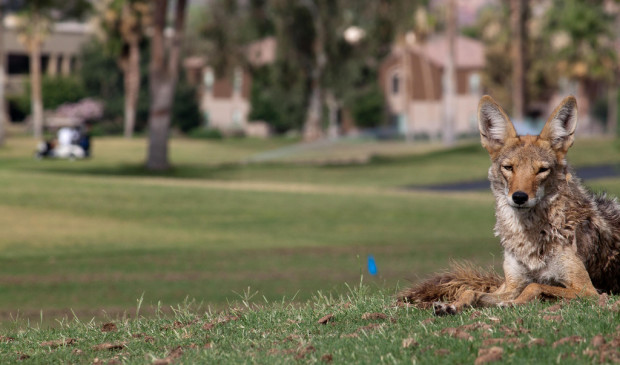Coyote debate howls through committee
Thursday, March 31, 2016 by
Elizabeth Pagano Debate over the region’s coyote policy continued at City Council’s Public Safety Committee on Monday, where public comment on the city’s policy took center stage for about an hour.
In November 2014, the city passed a coyote management plan, and as part of the plan’s implementation, a few changes have been made at the city level since then, to the relief of some and the agitation of others. At the heart of the issue is a conflict over when, exactly, coyotes constitute a threat to the public and what, exactly, should be done.
Mike Bodenchuk is the state director for Texas Wildlife Services, which has worked with the city and county on coyote management since 2005. He explained that, among other things, his agency is authorized to deal with coyotes that exhibit aggressive behavior. It does support nonlethal means of managing the animals and spends the majority of its time on education and community outreach, he said. He told the committee that, contrary to testimony by concerned citizens, the agency used padded foot traps, not leg traps.
“I want to be clear about this: We are not punishing coyotes for eating a cat,” said Bodenchuk. “We are trying to prevent additional losses and additional aggressiveness on the part of coyotes.”
Bodenchuk said that since November, his agency has been receiving screened calls referred from the 311 system and he was “concerned that practice is compromising our decision model and our ability to do our job.” He said that the agency is not receiving calls about coyotes killing pets, sending its metrics “down the tubes.”
Assistant City Manager Bert Lumbreras acknowledged that there has been a change in how the city directs 311 calls to Texas Wildlife Services, and he clarified that according to the policy adopted by the city, those 311 calls should be routed through the city’s Animal Services Office. He said the city would be “happy to collaborate with Texas Wildlife Services as one of the experts, but the calls should not be going directly to them.”
Lumbreras said the city was working through “some issues” with Texas Wildlife Services but is very open to making it work. He also said that, at the present time, the data suggest that coyotes are not a public safety issue in Austin. “To essentially conclude that there will be a public safety risk when there has been an interaction with a coyote is just not where we are at at this point.”
In addition to making changes to the 311 protocol, the city has backed away from trapping coyotes that have been spotted and is advising Austinites to do “hazing” to scare off coyotes that aren’t otherwise causing trouble.
“At the end of the day, the city staff is responsible for administering the policy, not Texas Wildlife Services. We do not have a contract with Texas Wildlife Services,” said Lumbreras, who clarified that the city has maintained a longstanding interlocal agreement with the county.
Speaking against the new city process, resident Michael Fossum said that Chief Animal Services Officer Tawny Hammond’s efforts to “set up a program of her own within the city” reflect her belief that no coyotes should be removed unless there has been an attack on a human.
“The problem with that is, that’s not effective, and we’re going to pay the price in increased costs and also in increased attacks on pets and, eventually, human beings,” said Fossum.
However, Hammond denied that the city has a no-kill policy when it comes to coyotes. Instead, she likened the policy to “how the city would handle any other wild animal presenting a public safety threat” and said that it was, as a result, focused on specific animals causing problems in the city.
Others brought larger issues with them to the committee meeting.
Brenda Collier, who lives in the Zilker neighborhood, spoke against allowing the U.S. Department of Agriculture (via Wildlife Services) to manage coyote control instead of the city. She said it allows for the use of “horrifyingly cruel” traps that are dangerous to all animals – including humans.
Collier took particular issue with the role of the federal agency, which she said “has taken pleasure in killing coyotes in an inhumane manner.” By way of an explanation, she furnished a recent report from Harper’s Magazine that details the agency’s animal control practices.
“I don’t want this agency operating in the United States of America, I don’t want it operating in my backyard, and I don’t want it in Texas or this city,” said Collier, who urged the city to empower Animal Services officers to manage the problem.
As for the Harper’s article, Bodenchuk said, “I don’t get biological information from Harper’s Magazine.” He added that the article deals with an employee from the 1980s and does not reflect current practices in Texas. If there were a nonlethal way to deal with coyotes that had been habituated, he said his agency “would be the first people to implement that” and assured the committee members that the traps his department uses are humane.
On Monday, the committee took no action on the policy but indicated a desire to continue cooperation with other agencies and stakeholders.
“I understand the passion that everybody has,” said Council Member Ora Houston. “What I would like to do is to … keep working with the county to see if we can get this where it’s workable for both the city and the county. And it sounds like we are on that path now and have been on that path for a while.”
Photo by Dru Bloomfield made available through a Creative Commons license.
You're a community leader
And we’re honored you look to us for serious, in-depth news. You know a strong community needs local and dedicated watchdog reporting. We’re here for you and that won’t change. Now will you take the powerful next step and support our nonprofit news organization?









